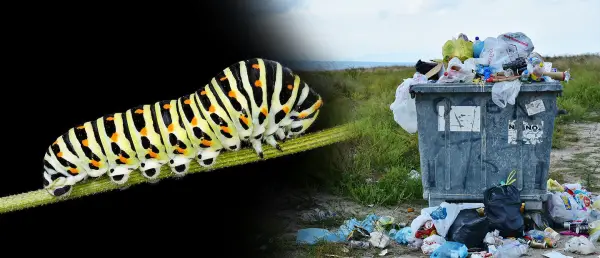Plastic-Eating Caterpillars Could Become The Solution To Our Plastic Problem
Tags: opinion

By Mayukh Saha
Plastic is undoubtedly one of the greatest menaces facing the world at the moment. There simply seems to be no feasible way of dealing with them. Burning them pollutes the air and burying them will damage the soil. You cannot even throw them into water bodies and live in peace.
Scientists around the world have been trying to figure out ways to tackle the plastic problem. Yet, it has to be admitted that there hasn’t been much success in this regard. The path that most scientific research follows is logical. By this, I mean that one thing leads to another in science and they are tied by strings of reason.
Yet, sometimes, pretty unexpected things come up. It wouldn’t even be wrong to say that such unexpected occurrences change the world and change science as a whole. Remember Newton and his apple? Something similar has happened yet again.
A paper published recently in the Current Biology journal has revealed the existence of a certain moth that can eat plastic. Yes! You read it right. They literally chew and gulp plastic down as you’d do with a sandwich or something.
Federica Bertocchini – a Spanish biologist at the University of Cantabria and an amateur bee-keeper – noticed some caterpillars lapping up honey from her hives. Deciding to observe them, she put them in a plastic bag and took them home with her.
However, the caterpillars meant to surprise her and they executed it very well. A while later, she found out that the caterpillars had made many holes in the packet and had escaped onto her floor.
Over 5000 people have downloaded our free ebook “Growth Hacking Tips And Rituals For Optimal Living” CLICK HERE to get your free copy now
She identified these caterpillars as larvae of a common hive pest, known as the Greater Wax Moth. Their escape sparked the idea that they could indeed help with the garbage disposal.
In the past, other organisms had been tested for this capability to eat plastic. Yet, even the best among them took a long time. This one was fast. Really fast!
Consequently, Bertocchini undertook an experiment along with biologists Christopher Howe and Paolo Bombelli from Cambridge University. It was found that many plastics have chemical bonds similar to bee-wax. Only some organisms, like this one, have the enzymes needed to break these methylene bridges. This is one of the reasons why plastic is non-biodegradable.
Since polyethylene is arguably the toughest of all plastics, the trio conducted the experiment using this material. In earlier tests, the bacteria Nocardia asteroides took around six-months to decompose polyethylene. Like the scientists themselves, you’d be surprised to know the time taken by the wax moth for the same task. They made holes in less than 40 minutes. Yes, not even an hour but only 40 minutes.
On an average, they chewed 2.2 three mm. holes in an hour. In half a day (12 hours) these caterpillars could devour a milligram of the material. In a month, a hundred such caterpillars could finish eating one 3-gram polyethylene bag.
It’s still not known whether the plastic does any good to the moths themselves. Many other factors, including the toxicity of their feces, have to be taken into consideration before these are officially accepted as plastic decomposers.
Anyhow, the findings undoubtedly open up the prospects of a plastic free world.
Leave Comment: